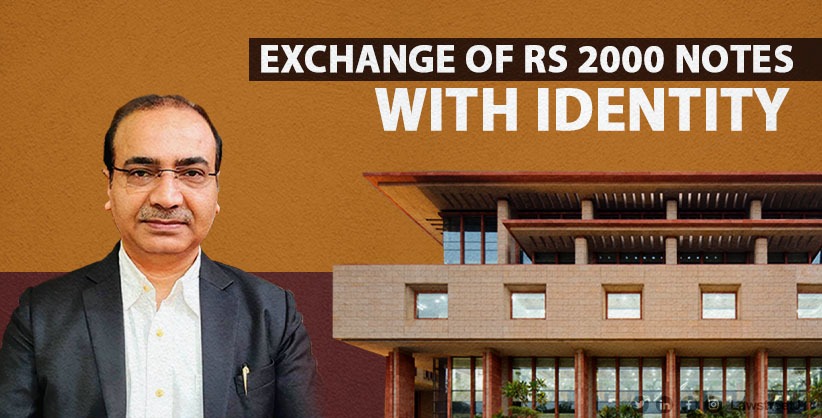NEW DELHI: Eminent PIL advocate Ashwini Kumar Upadhyay has approached the Delhi High Court challenging RBI's notification of May 19 and SBI's of May 20, allowing exchange of Rs 2000 currency notes without any requisition or identity slips.
He contended the notifications are arbitrary, irrational and offend Articles 14 of the Constitution of India.
He also sought a direction to the RBI and SBI to ensure that Rs 2000 banknotes are deposited in respective bank accounts only so that the no one could deposit the money in others bank account and people having black money and disproportionate assets could be identified easily.
Upadhyay has been consistently raising the demand for doing away with currency notes of above Rs 100 denominations and cash transactions to the sum of above Rs 10,000.
"Recently, it was announced by the Centre that every family has AADHAAR Card and Bank Account. Therefore, why RBI is permitting to exchange Rs 2000 banknotes without obtaining identity proof. It is also necessary to state that 80 Crore BPL families receive free grains. It means 80 crore Indians rarely used Rs 2000 banknotes," he contended in his PIL.
His plea stated that it is necessary to state that RBI admits that total value of Rs 2000 banknotes in circulation have declined from Rs. 6. 73 lakh crore to 3.62 lakh crore, which 3 lakh crore has been reached either in individual's locker or has been hoarded by the separatists, terrorists, maoists, drug smugglers, mining mafias and corrupt people.
The petition stressed that cash transaction in high value currency is the main source of corruption and is used for illegal activities like terrorism, naxalism, separatism, radicalism, gambling, smuggling, money laundering, kidnapping, extortion, bribing and dowry, etc and the RBI and SBI should ensure that Rs 2000 bank notes are deposited in respective bank accounts only.
Presently, total population of India is around 142 crore and total number of families are 30 crore and 130 Crore Indians have AADHAAR Card, which confirmed that every Indian family has 3-4 AADHAAR card. Similarly, total number of accounts are 225 Crore and out of that 48 crore are Jana Dhan accounts of BPL families, which confirmed that every family has a bank account.
"Now the question is why RBI is permitting the currency exchange instead of directing to deposit Rs 2000 notes in Bank Account," he asked.
He cited a recent survey conducted by Transparency International, a global coalition against corruption, which stated in India between 17th June and 17th July 2020 with 2000 participants revealed that India has the highest bribery rate in Asia.
Referring to malice of corruption, he said it undermines democracy and rule of law, leads to violations of human rights, distorts markets, erodes quality of life and allows organised crime like separatism terrorism, naxalism, radicalism, gambling, smuggling, kidnapping, money laundering and extortion and other threats to human security to flourish.
It hurts BPL families by diverting the funds intended for their development, undermines government's ability to provide basic services, seeds inequality and injustice and affects foreign aids and investment, he added.










